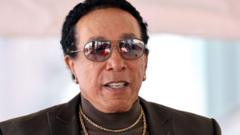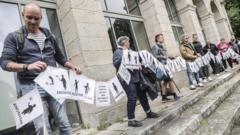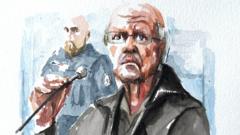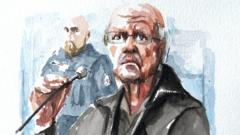As the trial of convicted paedophile Joel Le Scouarnec approaches its conclusion in Vannes, southern France, victims are voicing their anger over the perceived apathy from society and government. Despite overwhelming evidence against him, including admissions of assaulting 299 children, many feel ignored. Victims have resorted to forming their own advocacy group to raise awareness, shedding light on institutional failings that allowed the abuse to continue.
Outcry Grows Over Indifference to Le Scouarnec Child Abuse Trial in France
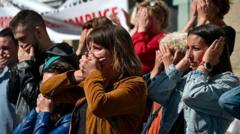
Outcry Grows Over Indifference to Le Scouarnec Child Abuse Trial in France
Victims of the notorious paedophile surgeon Joel Le Scouarnec express frustration over the lack of public interest and political response to their plight during the high-profile trial.
In the southern Brittany town of Vannes, the trial of Joel Le Scouarnec, a retired surgeon and France's most prolific known paedophile, is drawing to a close, but instead of the anticipated widespread attention, the proceedings have been met with a disappointing silence. Le Scouarnec stands accused of raping or sexually assaulting almost 300 children, yet many victims are lamenting the lack of public interest and political engagement surrounding what they believe to be a crucial trial.
"I’m tired. I’m angry. Right now, I don’t have much hope," stated Manon Lemoine, one of Le Scouarnec's victims. "Society seems totally indifferent. It’s frightening to think [the rapes] could happen again." In response to their grievances, Lemoine and roughly 50 fellow survivors have formed an advocacy group to confront the government about the apparent neglect and the “landmark” nature of their case, which they feel has highlighted systemic failures within French institutions dealing with child protection.
The trial, designed to become a defining moment for the French public, has instead felt muted, with many victims feeling invisible due to the sheer number of those wronged. "The sheer number of victims seems to have overshadowed individual stories," noted Maëlle Nori of the feminist group Nous Toutes (All of Us). Absence of prominent individual narratives like that of Gisèle Pelicot, whose case earlier drew worldwide attention, has left many feeling disenfranchised.
Le Scouarnec, who has acknowledged his crimes taking place between 1998 and 2014, meticulously documented his abuses in black notebooks while targeting vulnerable victims under the guise of medical care. His depravity has been shocking, prompting many discussions about the institutional negligence that allowed his acts to continue unchecked. Failure by medical officials, who turned a blind eye to reports—some dating back to 2004—has amplified calls for accountability and systemic reform in France's pediatric healthcare.
Despite the grim subject matter, many victims have found moments of solidarity within the courtroom, bonding over shared experiences of trauma. "This trial feels like a healing process, a chance to confront our past," shared Lemoine, who, like many, has chosen to reveal her identity to bring attention to their plight.
As the trial nears its conclusion, with Le Scouarnec expected to receive a life sentence, victims and advocates have expressed determination to ensure that the case resonates beyond the courtroom. "We need to unite and ensure this trial leads to meaningful change," urged Arnaud Gallais of the Mouv'Enfants NGO. Meanwhile, the heartbreaking reality remains: as the trial concludes, the wider societal response will shape the future conversation on child sexual abuse in France, pitting those who seek change against those who prefer silence.




